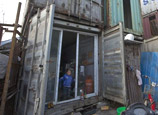
"Its success has big significance and value to the company."
Kevin Reinhart, an 18-year Nexen veteran who had served as interim CEO for the company since January 2013, remains in charge. Nexen formed a new board chaired by Li, and with members from both companies, including Reinhart.
CNOOC's keeping Nexen autonomous is one of the main reasons the company's workers aren't anxious about the takeover, said Reinhart.
Nexen's oil-sands assets in Canada, the United Kingdom, the North Sea and offshore West Africa will be managed from its Calgary headquarters, as will about $8 billion worth of CNOOC's North and Central American assets, said Patti Lewis, Nexen's spokeswoman.
"For Nexen, it means immediate growth," said Lewis. The Chinese company's financial backing and other support will allow Nexen to "realize the full potential of its opportunities."
"Both companies share many of the same goals and values," she said. "I think our two cultures will help to reinforce each other and make the combined company an even better one."
CNOOC will seek to retain Nexen's current management team and employees and will provide compensation that is not less than what it was before the transaction, Lewis said of the commitments.
The Chinese offshore oil producer also has agreed to build on Nexen's existing community and charitable programs, particularly to First Nations (Canada's indigenous peoples) and local communities.
CNOOC - the world's largest dedicated exploration and production company by market capitalization - will absorb Nexen's $4.3 billion debt.
CNOOC's CEO Li said the deal is worth the price.
"We did not overpay for it, but, rather, we paid the right price," Li told the Shanghai Securities News, adding that the asset is in accordance with CNOOC's "long-term strategy, and the price conforms to the level of the industry."
The two companies had formed a relationship before they announced the deal. In 2011, CNOOC acquired Opti Canada Inc, Nexen's partner in the Long Lake oil-sands project. That year, the two set up a joint venture in the Gulf of Mexico, which gave CNOOC a working interest in up to six deep-water exploration wells in the Gulf.
CNOOC's Li said following the Nexen acquisition that the company will focus on developing the "full potential of Nexen's resources" and will refrain from any big deals in the oil patch "in the very short term". He said that CNOOC won't develop shale gas in the near future as some speculated.
Canada gets fund
Canada has been a popular investment destination for major Chinese oil and gas companies. Until the Nexen deal, CNOOC had invested $2.7 billion in Canada since 2005.
With its rich natural resources, the country has attracted an average of $12 billion annually in the past three years, according to the Bank of Montreal. With the Nexen deal, China's investment in Canada will have surpassed $25 billion in 2012, according to the bank, making China the fifth-largest foreign investor.


















 Photo: Bird flu fears hits poultry industry
Photo: Bird flu fears hits poultry industry


![]()
